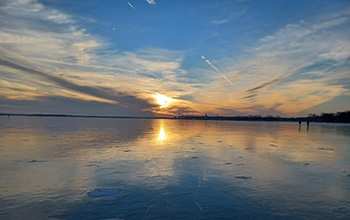Research News
January freeze dates becoming the norm for many northern US lakes
Climate change is driving later freeze dates and earlier thaws in lakes
February 17, 2022
When Lake Monona in Madison, Wisconsin, froze over a few days after New Year's Eve, it marked the beginning of ice season, a time of year when, once the ice gets thick enough, the bodies of water in this lake-rich city become host to a variety of outdoor pursuits.
Winter is a time when the lakes are open to all, no sailboat, speedboat nor pontoon needed. From walking a dog on the lakes' frozen surface to ice fishing, skating or boating, people's relationship with the lakes changes.
But this January's freeze date was a sign of another change underway, according to scientists at the University of Wisconsin-Madison and the U.S. National Science Foundation's North Temperate Lakes Long-Term Ecological Research site.
Climate change is driving later freezes and earlier thaws for bodies of freshwater across the Northern Hemisphere. Scientists have been keeping track of those dates for some 170 years -- long enough to see trends in lake ice "seasons."
Since researchers started keeping records, the number of days lakes spend covered in ice each winter has shrunk by a month. While it was once common for lakes to freeze in mid-December and hold ice until April, the more common story now is a January freeze date and March thaw.
The official freeze date for Lake Monona this year was January 3, with Lake Mendota following suit four days later on January 7. Those dates don't rank in the top 10 latest freeze dates on record, but they are more than two weeks later than the median freeze date of December 20.
Since record keeping began in 1852, the median freeze date of Madison's lakes has been December 20. But that number can be misleading. While many freeze dates in the first several decades of ice records are earlier, the last few decades reveal a very different picture of what a "normal" ice season now looks like.
Half the freeze dates on Lake Mendota over the last 30 years have been in January. Over the last decade, eight of Lake Mendota's freeze dates were later than the December 20 median, including seven in January. Before 2010, there wasn't a single decade in the lake ice data when most freeze dates were in January.
Lakes around the world are rapidly losing their winter ice, scientists have found. Some regions may soon enter a period when ice-free winters become the norm and dangerous, unstable ice conditions become more common during freeze-and-thaw cycles.
-- NSF Public Affairs, researchnews@nsf.gov





修改评论